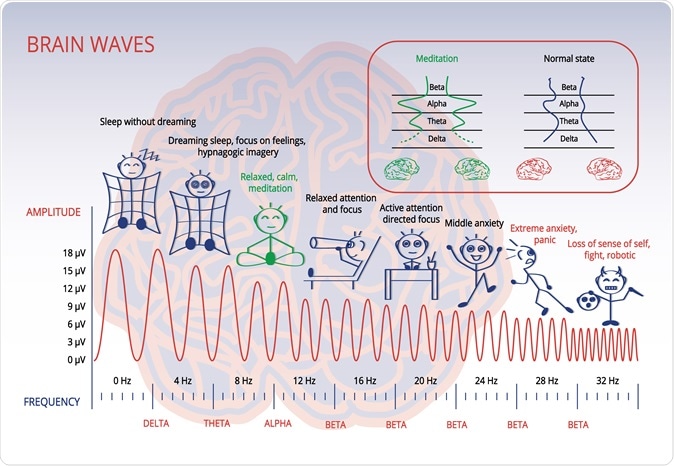Patients with Parkinson’s disease are known to have abnormal brain waves especially beta waves in their subthalamaic nucleus (STN) region of the brain.
Until now there have been no studies that connect these abnormal beta waves or “β-band oscillation” and the movement difficulties typically seen with Parkinson’s disease. Authors write, “Previous studies demonstrated that l-DOPA decreases the β-band (13–30 Hz) oscillations with improvement of motor symptoms”. L-DOPA is the standard treatment for Parkinson’s disease.
A new study from the researchers at the Osaka University worked at making a neurofeedback system whereby the patients with Parkinson’s disease can themselves voluntarily control the beta wave activity in their own deep brain and the effects this control might have on their symptom control. The results of the experiments were published in a study titled, “Real-Time Neurofeedback to Modulate β-Band Power in the Subthalamic Nucleus in Parkinson’s Disease Patients,” in the latest issue of the journal eNeuro.

Brain waves, relation between the amplitude and frequency with person's state. Credit: Polina Kudelkina / Shutterstock
Eight patients (3 males and 5 females) of Parkinson’s disease were included in the study. Lead author Haruhiko Kishima said in a statement, “In a study of eight patients undergoing a routine replacement of a pulse generator used for deep brain stimulation, we developed a method that could help scientists better understand the relationship between brain activity and disease symptoms.”
The patients were trained to change (Four were asked to increase while the other four were asked to decrease the size) the size of a black circle by voluntary control. The circle size was directly proportional to the intensity of the beta wave activity in some of the patients’ brains. The researchers noted that 10 minutes after the training the beta waves in the patients’ brains increased or decreased depending on the circle size. This allowed patients to control their own beta waves voluntarily.
According to co-author Takufumi Yanagisawa in a statement, “Although we did not observe an improvement in patients' symptoms, our study represents a new approach toward managing disease-related brain activity that could lead to the development of new treatments.”
Authors concluded that their, “feedback training successfully demonstrated that the β-band power of the STN could be modulated to increase or decrease based on the patients’ voluntary control. The neurofeedback training may be an effective method for revealing the pathophysiological role of the abnormal oscillations and for developing a novel treatment for Parkinson’s disease.”
Source: http://www.eneuro.org/content/5/6/ENEURO.0246-18.2018